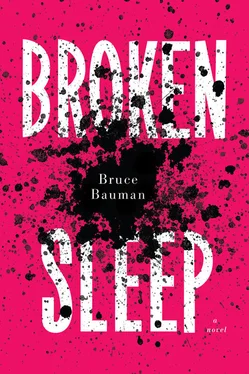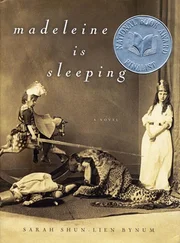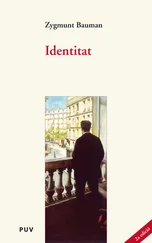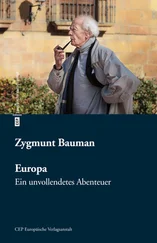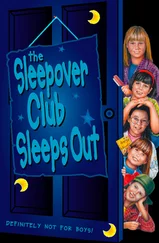— Franz Kafka
I’ve made an effort to tell my story in a linear fashion. Now this fallacious narrative of time has been undone by Mr. Parnell Palmer, government lackey, investigator for the Committee on Anti-American Activities. He showed up yesterday to “inquire” about the night of Alchemy’s death. He claimed he wanted to issue a report stating once and for all his death was an accident and to squash all the “vicious rumors.”
We met in Bellows’s office. Palmer’s unmowed-lawn eyebrows, tiny nose, lizardy neck, and bald head intrigued me. I sketched him while we talked. He eyed Dr. Bellows, who shook her head as if to say, “Let her do it.” Until now, I refused to meet with any “official.” What can they do? Lock me up? Ha. Palmer enticed me with the possibility of a visit from Persephone.
With more than a hint of incredulity, Palmer began by asking why my nurse had been off that night. I told him I had no authority to dismiss anyone, so I assumed Alchemy or Laluna gave her the night off because of the Super Bowl party. No denying that Alchemy and I argued earlier that day over Laluna’s refusal to allow me to care for Persephone when they went on vacation. From the first, my relationship with Laluna had waned and waned farther. I wanted a grandchild, but I’d correctly sniffed her lack of enthusiasm for motherhood.
Palmer kept pushing me to defend my absence from the party. Reason seemed to bounce off his bald head. He couldn’t understand why I always refused to attend that celebration of modern slavery and violence. I told him that I didn’t leave my cottage or studio until later that night, when it was already too late. That was true in all meanings of truth.
“At times you have said that you and Mindswallow were both at your cottage when you heard Moses, Laluna, and Alchemy arguing. At other times you claimed you weren’t sure where Mindswallow was. Which is it?”
“The answer is both. I heard bursts of their yelling when he banged on my door, while he was there. I’d taken some pills and was lost in drowsyland when Ambitious showed up. I’m sure he told you what happened. Why do you need me to confirm it? For all of his inverted thinking, he is not a liar. Nor, as he fancies himself, is he a killer.”
“You have called yourself ‘a homicider’?”
“What are you insinuating?”
“Well, first there was the ‘performance’ with Art Lemczek, then the incident where you stabbed Laban Lively with box cutters. And isn’t it true you tried to burn Nathaniel by setting the house in Charlottesville on fire?”
“Exactly the opposite. A well-trained Pavlovian mind like yours is conditioned to bite only your enemies. I bite my loved ones — to save them. With his blessing, I saved Art from an arduous, painful death. That wasn’t homicide. And I acted to save Nathaniel from himself.”
“By setting a fire outside his locked room? Unique concept. Killing or trying to kill friends and loved ones. Perhaps you thought you were saving your son the nigh—”
I chomped at his hand. He flinched. “I also bite my enemies.”
“And Moses was your enemy. Isn’t that why you told Malcolm Teumer you wished your son Moses had died?”
“How do you know that? Malcolm Teumer was a liar. That’s not what I meant.”
“Maybe, but”—he pointed to Bellows’s computer—“I can arrange it so you can listen to yourself anytime.”
“You were taping my conversations? Or Teumer’s? No matter what you want to believe, I did not kill my son. I’m done.” I stood up and showed him the drawing — his eyebrows as tiny leeches eating away his face.
“Is that me?”
“Oh, yes. I need you to sign it.”
“Why?”
“When you awaken tonight, you’ll know why.”
He mumbled “nutcase” and started packing his things.
Bellows knew me well enough to see I was joking, but not well enough to understand my motivation. Once Palmer left, I said to her that he was trying to intimidate me. People like him are afraid of anything that smacks of the extraordinary. I did what I could to intimidate him back. I admitted to her that I only vaguely remembered the fire. She answered, “We’ll talk tomorrow.”
So many memories are etched on my brain like ineradicable ancient pictographs, and others, so soluble, have been washed away by the waterfall of human aging and Collier Layne cocktails.
Too clear in my memory is the hollowness of the Harlottesville house. The shadow of my Somersby diddle-daddle ended the pretense of my adaptability to a southern belle jar domestic life. I hoped for a change in the slavish air when Alchemy returned at Thanksgiving. A vicious migraine struck me and ruined the dinner. After hours in my lightless room, I woke up feeling worn-out and unmoored. I stepped gingerly downstairs. Deep into their drinks, Alchemy and Nathaniel were talking intensely while listening to the Louis and Ella sessions. I halted in the hallway and overheard Alchemy ask Nathaniel, “Why do you put up with her antics?”
Antics? I jammed my jaw shut.
“A question I have asked myself, oh, a thousand times. I think she’s as beautiful as the day I first saw her in Max’s. She’s an artistic genius and, at the same time, a child who needs me to take care of her. Her moral compass may seem askew, but she’s never been a phony. She is exactly who she presents herself to be. And she may not see it, and you may not see it, but I need her.”
“I see it but I don’t totally get it.”
“So much of what I struggled to achieve is being trampled by the forces of regression. If it weren’t for Salome, I might’ve fallen into my cups and given up. When she is her best self, she acts with absolute faith in her abilities, in mine, in yours. When she is in a red or blue period …” His voice trailed off. “The year in Paris, when you two stayed in New York, I was miserable without her. I took this teaching gig because I thought it would help us. Ruggles thought so, too. We were both wrong. What can I say? She drives me almost as batty as she is”—he laughed—“yet I always love her madly.”
“I can’t imagine life with my mom and what it would’ve been like without you. I won’t ever forget.”
How could he not understand how much I’d done for both of them by being with Nathaniel?
I eagerly returned to New York after the New Year while Nathaniel stayed in Virginia. It turned out disastrously. AIDS had denatured the city of so much vitality. Many friends had moved. Or died. The art market had crashed in ’87, Gibbon closed his gallery and now relaxed in style in the Hamptons. The Whitney Biennial curators, who I’d previously brushed aside, now rebuffed me. Leslie Tallent penned a piece on the younger artists I’d influenced, which made me feel like a has-been. I spent some nights with old friends like Xtine and some new ones. And too many alone. My nonstop movable feast of the ’60s and early ’70s seemed to have settled into an antiquated garden party with cocaine on a cracker as an hors d’oeuvre. Instead of burning down the castle, these kids lined up around the block to get inside.
My son’s busy life didn’t include me and my “antics.” Absurda, or Amanda, as we called her then, and I adopted each other as surrogate mother and daughter. When I received the invite to Blind Lemon Socrates’s imminent-death-from-colon-cancer requiem/extravaganza at Alexander Holencraft’s new apartment in the Dakota, I asked Absurda to be my date.
Mostly, I enjoyed the night. I dressed accordingly in ankle-high, rust-red boots, a short but not too short maroon dress, and a half-length silver faux-fur jacket with a pink boa around my neck. I did not enjoy the questions: “Where have you been?” and “How are you?” I asked instead, “How do I look?” The answer was fucking fantastic.
Читать дальше
